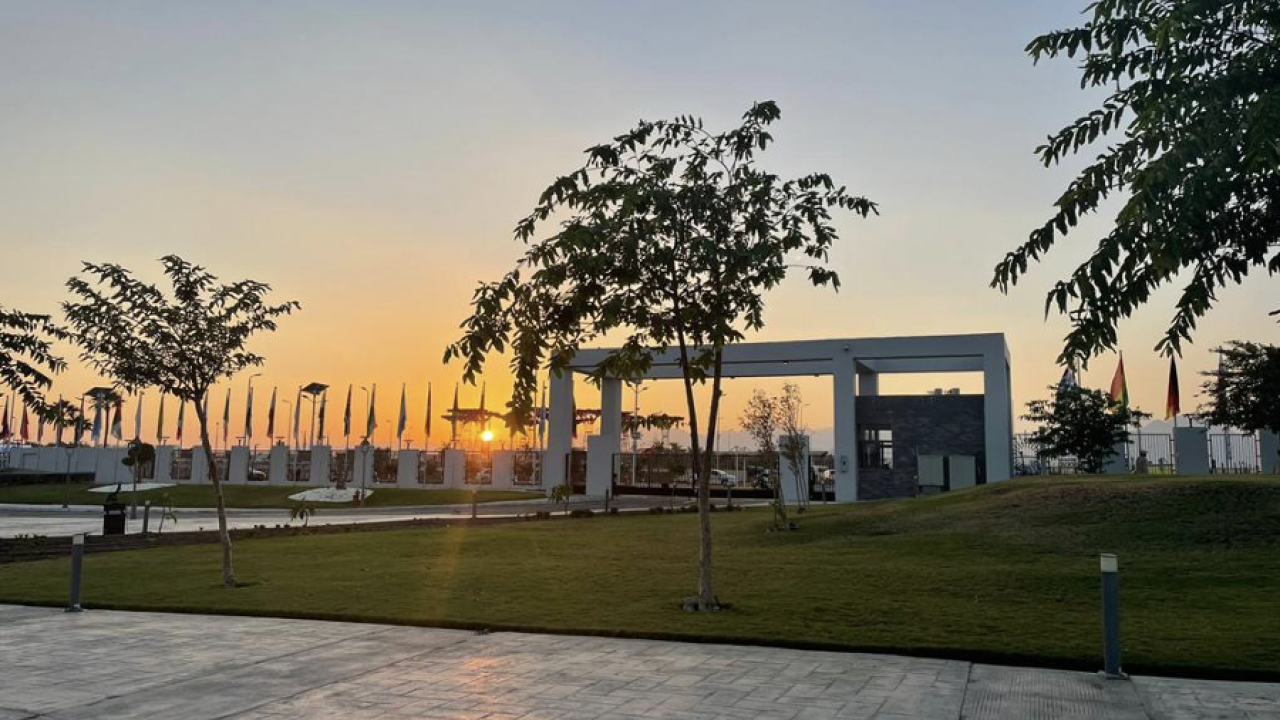A day in the life of a young negotiator at COP27
All opinions in this article are personal.
COP27 was held from Sunday 6th November to Friday 18th November in Sham El-Sheikh, Egypt. For me, each day was different. In this article I reflect on what a day looked like as a negotiator.
At 23 years old, I am the UK’s youngest negotiating delegate. And while this was my first COP, youth activists from around the world, many younger than me, have been involved in COPs for years.
At COP27 world leaders were addressed by activists as young as 10. Hundreds, if not thousands, of young people attended in a variety of capacities: as negotiators, activists, representing civil society organisations (CSOs), as part of governments’ delegations, and for the Conference of Youth (COY).
Anyone who was at COP27, particularly from my team, might notice a few discrepancies in the timings and sequencing of this ‘day in the life of a young negotiator’. They’d be completely correct. I’ve pulled together some moments from a few different days; I’ve merged moments for a of couple reasons. Firstly, I wanted to draw out a flavour of the vast variety involved in negotiating. And secondly, in my memory some of my days at COP have rolled into one.
COP27 was a unique experience. Permit me to demystify the complex world of UNFCCC negotiations for other aspiring youth negotiators.
06:45
My alarm goes off at 06:45. Twelve hours in a conference centre means that the desire to snooze my alarm is overpowered by the need for sunlight, exercise, and a refreshing splash of cold water. I pull on my shorts and t-shirt for a quick jog before hopping into the water for a swim.
07:30
By 07:30 I’m in the shower. I button up my shirt, choose a tie, lace up my shoes, and hurry out the door for our delegation meeting which starts at 07:45. We run through an overview of yesterday’s highlights and today’s key events. A stuffed ‘Paddington Bear’ is awarded as a prize for the negotiator who went above and beyond the day before, either through hard work, skill, kindness, or determination. The winner gets to have Paddington accompany them for the day.
08:20
The del (what we call the delegation) meeting finishes just after 8:15, in time for those with 9am meetings at the conference centre. Formal negotiations aren’t meant to start until 10. However, at COP27 night and day blur into one. Most hours of the day someone in our team is working. Negotiations run late into the night and start early in the morning. In the last few days of COP, one colleague’s negotiations finished at 03:00, with negotiators permitted to leave on the condition that they returned at 08:00 (yes, just five hours later). No, it’s not healthy, but to get 197 parties to agree, it’s what it takes.
08:30
At 8:30 we try to have a team breakfast. My team - Adaptation & Loss and Damage - pull together a couple of tables. We grab food for breakfast and also grab some bread and cheese for lunch. Making lunch at breakfast is crucial because sandwiches in the centre cost USD$12 and involve an hour in the queue. Over breakfast we discuss priorities for today and any ‘overnight’ developments as co-facilitators and the UNFCCC secretariat often work through the night to prepare decision text for parties to work on the next day.
09:00
After breakfast, I pop back to my room to brush my teeth, then run to join a queue with half a dozen other negotiators for the bus. The ‘trusty’ SH2 electric bus drops us at the centre at 9:45. While it should only be a 15 minute drive, the bus takes 45 minutes to tour around southern Sharm (the lack of stop buttons on the buses provided an excellent opportunity for international collaboration: “if we all shout stop in our own language then maybe the bus will stop!”). Arriving at the conference centre, I quickly pass-through security and then walk to the UK Delegation Office.
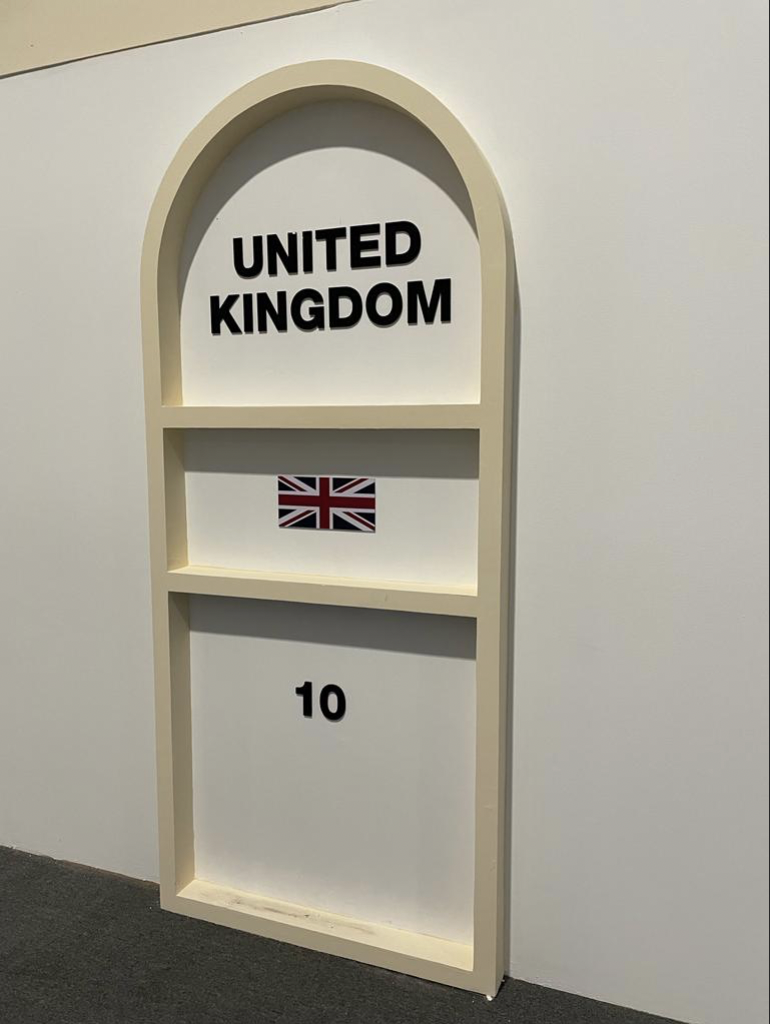
UK Delegation Office or ‘the Del’, No. 10 of course.
10:00
It’s 10am the del is a buzz of activity: negotiators, diplomats, ministers plus their advisors, and a whole host of UK civil servants, as well as visiting international negotiators, youth activists, and civil society representatives all coming and going in a squashed, temporary office in a marquee with aircon so loud you can’t hear anything. I connect to the patchy Wi-Fi and look at the UNFCCC “CCTV” on Grand Réserva. I add today’s negotiation sessions to our team calendar and check with my manager which rooms I’ll be covering. I scan my emails, check daily media, negotiations, and international reports. I’m ready(ish) for the day.
10:30
Around 10:30 a colleague in our team asks if I can cover the capacity building negotiating room this afternoon. They have a clash and need the time to prepare for more contentious items. I ask them to forward me the most recent texts so I can get up to speed.
10:50
At 10:50 I walk to Meeting Room 4 for Adaptation Committee negotiations which start at 11. Overnight, the text has ballooned from a few pages to nearer twenty to accommodate parties’ differing desires. Over the next hour, negotiators try to cut down the text by focussing on the most contentious issues. Progress is slow. The hourlong scheduled negotiation is quickly over. With only a couple more sessions scheduled under the current chairs, rapid progress is needed if this area is to be resolved. Parties agree to meet again for an ‘informal-informal’ meeting that evening.
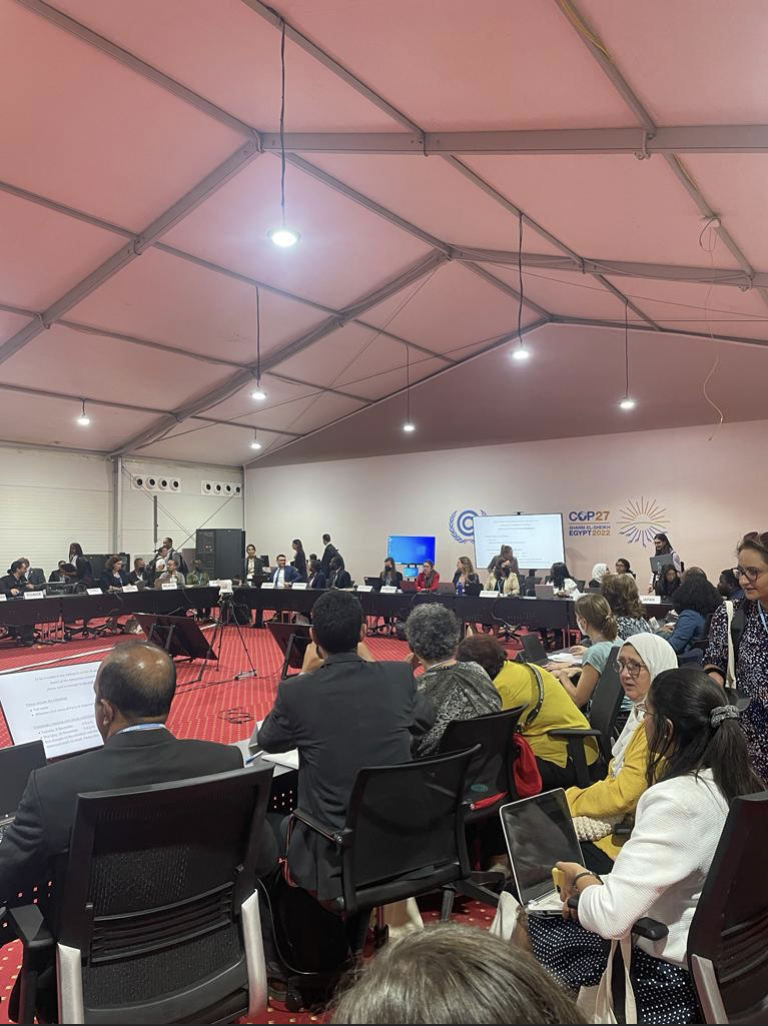
A busy negotiation room (yes, it’s a marquee)
12:00
At midday I rush back to the delegation office as I’m on the rota to be receptionist for the UK delegation office. Between midday and 1pm I help negotiators book meeting rooms for bilateral meetings, I direct UK and Scottish Government ministers, and welcome negotiators from Samoa. We have several groups of youth delegates and negotiators come to speak with senior officials and Thérèse Coffey brings some flowers for the office.
Around 12:45 my colleague who leads on Loss and Damage asks me to organise a bilateral conversation with her counterpart representing a negotiating group. I email her counterpart suggesting a few times to meet tomorrow, knowing that both of their schedules are rammed with negotiations, infs, inf infs and even the first few inf inf infs. It’s most likely they’ll only have time for a brush-by conversation in the corridor.
13:00
At 1pm I’m relieved from my reception shift. A friend has invited me to a screening of a short film called Act Now. It’s a series of inter-generational conversations about climate change. Inspiring and moving, it’s a respite from the last few days of intense negotiations, and simultaneously a reinvigorating reminder of the importance of the negotiations.
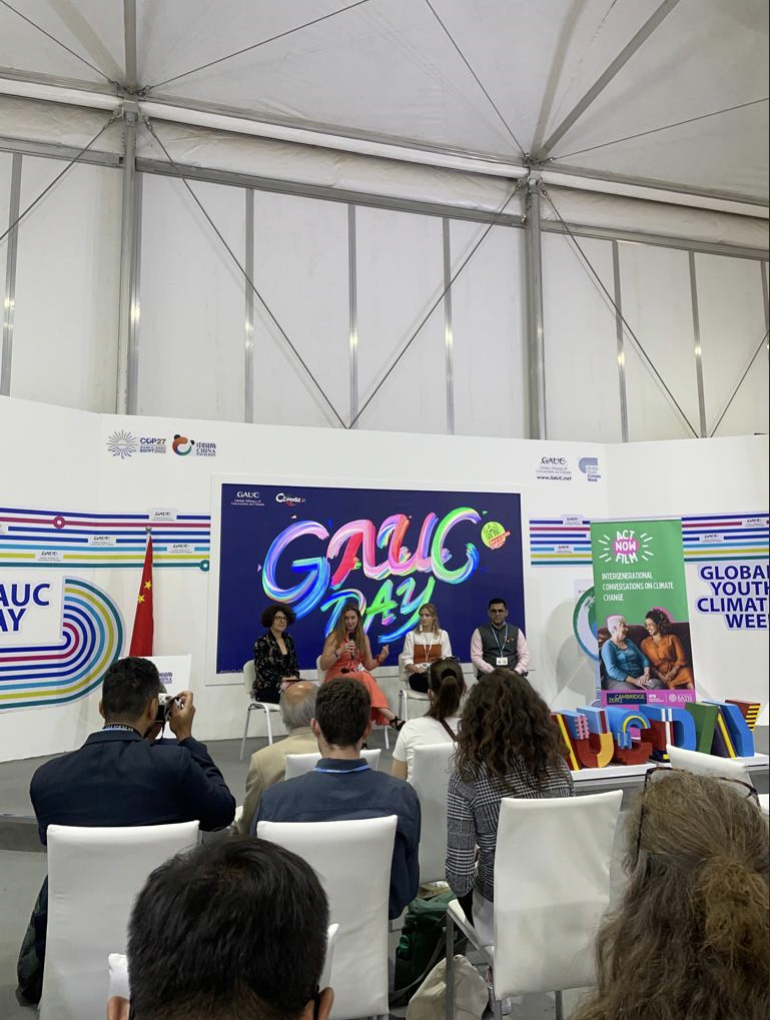
A panel of speakers introducing the film Act Now.
13:30
At 1:30, as I’m walking back through the pavilions, I spot a recognisable head of bleach blonde hair. A delegate turns to me, “was that Boris Johnson?” I nod.
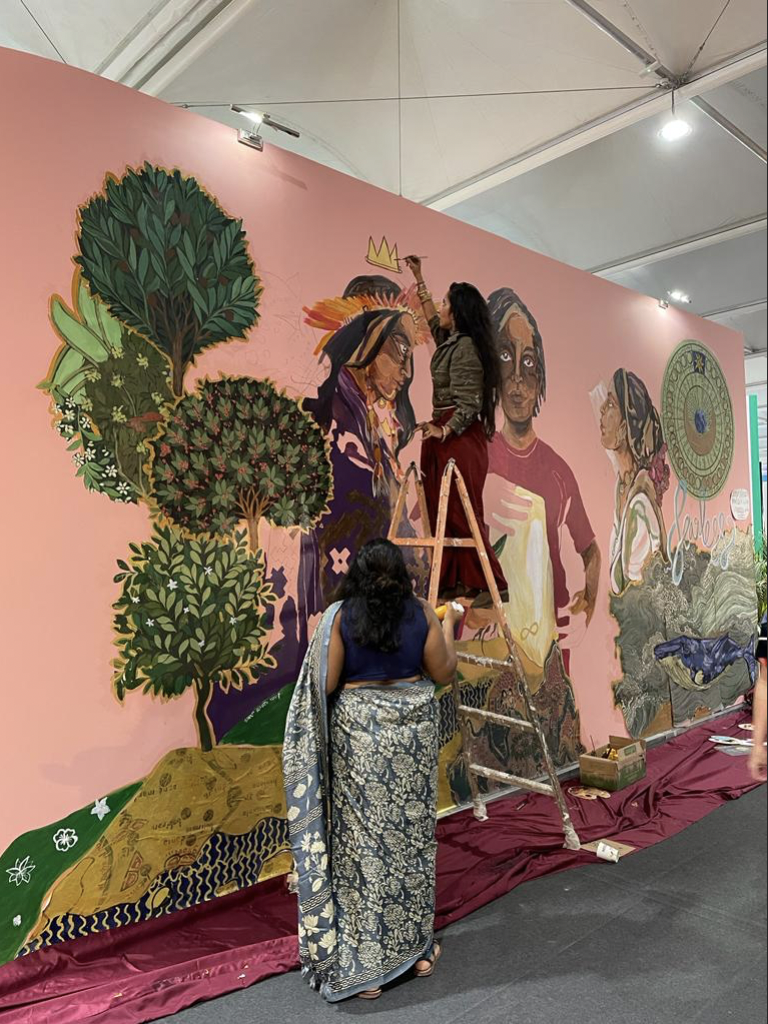
Artists paint a mural on the back of the Youth and Children’s Pavilion.
13:50
By 13:50 I’m outside Meeting Room 16 for another hour of negotiations on National Adaptation Plans. From 2-4pm parties continue to try and find an agreeable landing zone for this text. I support the UK’s room lead with note taking of key textual suggestions and movement of parties’ positions. Just before 3 pm a colleague relieves me so I can go to cover capacity building.
14:55
It’s 14:55 and I’m outside the marquee. I have a final read through of the text while preparing a possible intervention.
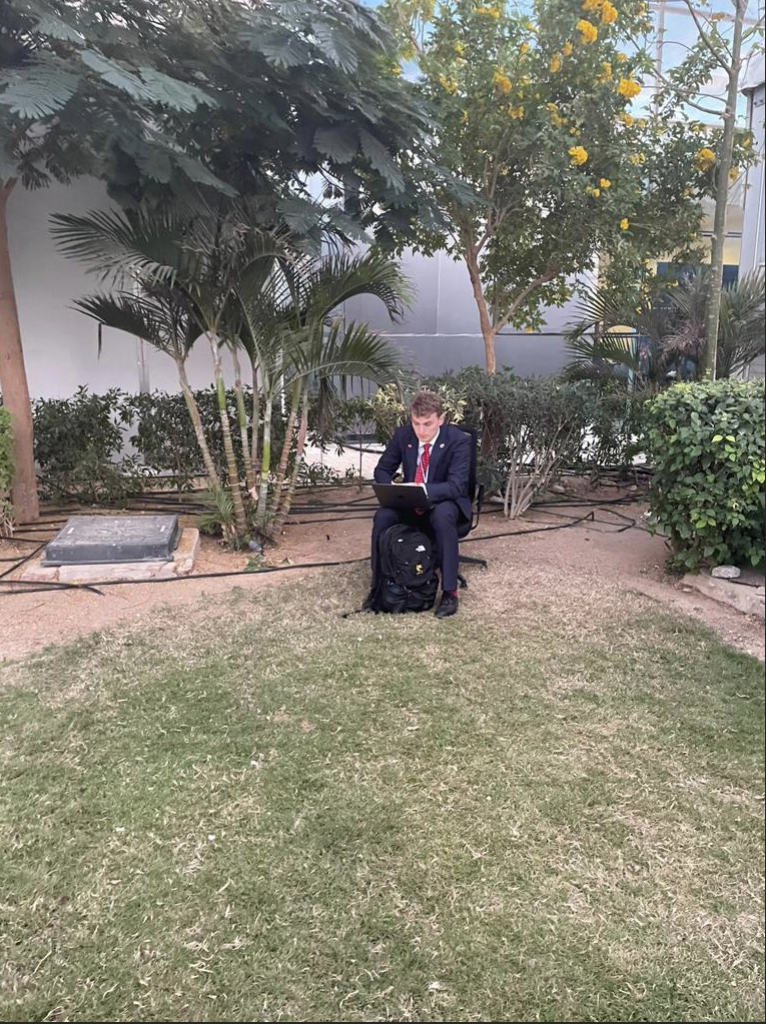
Impromptu office: preparing for negotiations in a spot of greenery
15:20
The room is being used for another negotiating issue and we don’t get in until 15:20. Parties are near to agreement on the capacity building text. There are a couple of technical points that need resolving, largely semantic issues.
16:00
I message our team asking if anyone needs sustenance, and receive two requests for sandwiches and one for cake. I drop them off in the del office where my colleagues are, and I go to sit in the ‘Bedouin tent’.
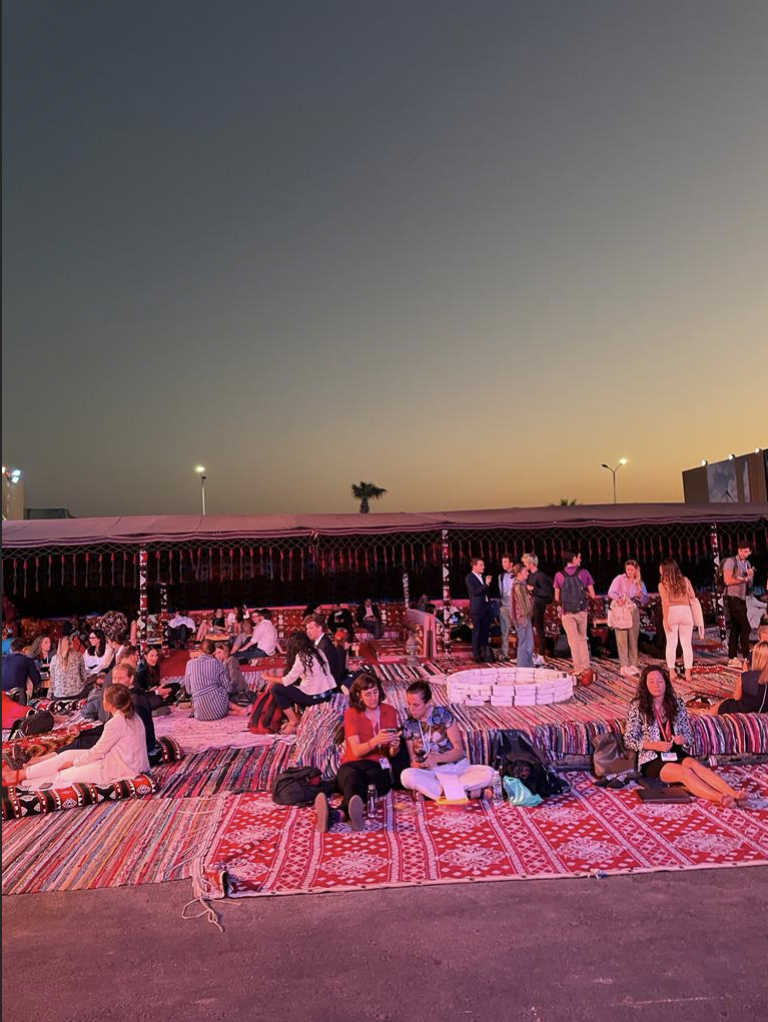
Delegates meet in the Bedouin tent as the sun sets.
Nearer to the equator the sun sets a lot quicker than my home in Edinburgh. I found that entering a meeting room in the daylight at 4pm, I would emerge at 5pm into night. For me, this only added to the lack of distinction between daytime and night-time. While the sun might be setting around 4:30, negotiations are far from finished.
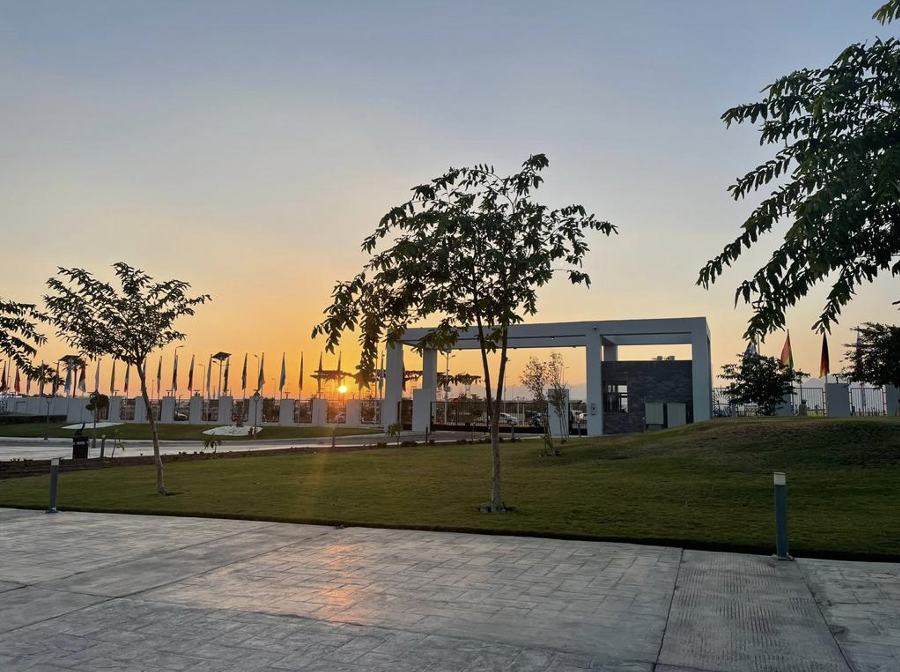
Sunset at COP27.
17:00
After a break in the Bedouin tent, I head to another negotiation, this time about matters relating to Least Developed Countries.
18:00
Negotiating session finished, we head back to the delegation office. Walking down the ‘central street’ of the centre I see crowds of delegates flooding out of the main exit. I would be lying to say I am jealous of those going to bed. While my friends would attest that I love an early night, I know that being part of the negotiations [including all the late nights] is a privilege. Of the 40,000 delegates purportedly at COP27, only a few were in the midst of the negotiations, dragging on into the night, looking for agreement.
19:00
Parties try to work on the most controversial bits of text; trying to remove those notorious square brackets [For those who have not yet encountered square brackets [sometimes double [and even triple] don’t ask - I’m not sure I fully understand] they denote text that has not yet been agreed by all parties].
This is proving challenging. We move to focus on the bits that have previously been worked through. We then try to agree as many paragraphs as possible and remove square brackets. Sometimes if feels like we’re going round in circles. But having been covering this room for the last few days it’s been a case of two steps forward, one step back.
22:30
After 10pm some parties start to get restless. Their delegates’ last organised transport is about to leave the centre and so they must leave, otherwise they’ll have to get taxis back which can be very expensive. Indeed, some negotiators working into the early hours have found themselves stranded and resorted to sleeping in the centre.
23:15
With the session seeming to be at an impasse, the informally appointed chair suggests we close the session and reconvene tomorrow. Sleep deprived negotiators wearily, happily acquiesce.
This is allowed as this session is an ‘informal informal’ negotiation and so not all parties have to be present.
23:30
With two other colleagues from the UK delegation, I leave the centre. The buses have stopped running so we must take a taxi home. We must negotiate a reasonable price. And after hours of multilateral negotiating, this two-party negotiation feels simultaneously exasperating and painless.
The driver speeds down the empty 5 lane motorway. Taking the roundabouts at rally-driver speed, we’re home in under 15 minutes. He tells my colleague (who speaks far more Arabic than I do) that before COP27, this road was a potholed two-lane dual carriageway. Now it’s a 5-lane superhighway. One of the many complex ironies of hosting the world’s largest international climate change conference.
23:50
I change out of my suit and slip into bed. I think about reading my book, but with my eyelids heavy I turn off the light and I am asleep instantly.
While I go straight to sleep, some negotiators continue negotiating at the centre, others continue to work from the hotel: rereading notes from today’s negotiations, preparing decision text or submissions, thinking about negotiating interventions and strategies for tomorrow. Their choice is whether to stay up late or wake up to work before breakfast.
Closing Reflections
A day at COP is perhaps a contradictory idea. Day flows into night and night back into day. There is always someone awake. Always someone working.
While I had a taste of this, as a younger negotiator I was spared some of the crazy long hours. This day I’ve outlined was a standard busy day, but some days I had a free morning or afternoon or evening when I could rest. For me, it was very important to use these times to recharge, so that when I was needed, I was ready.
I hope this weaving together of moments helps capture a flavour of the variety of work involved in negotiations: reading text, comparing suggestions, mapping positions, writing submissions, and giving interventions; as well as the work surrounding negotiations: briefings, bilaterals, multilaterals and events, and crucially, listening. Listening to other parties’ positions and priorities. Listening to learn. Listening to find agreement. Listening to build consensus.
With thanks to Phil for proofreading. All views and errors remain my own.
